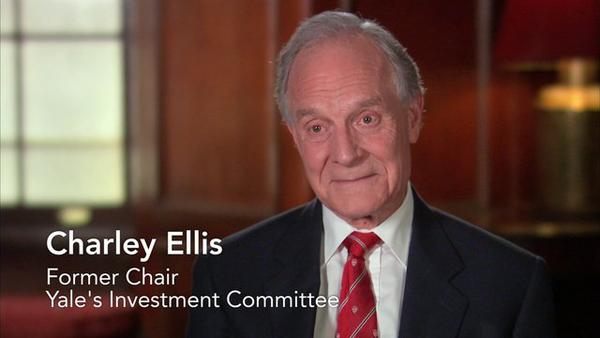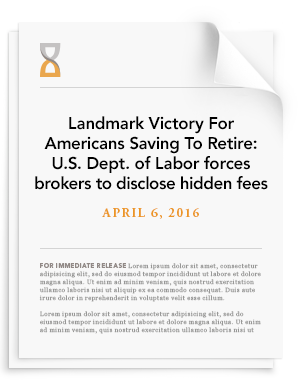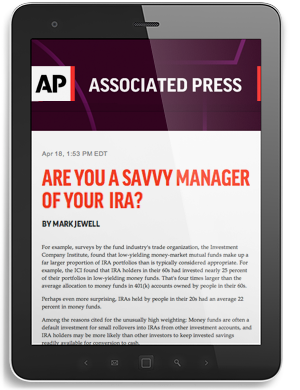Three Cheers For The New Rule Protecting Retirement Investors

“If we want to change the way innocent folks get treated, we need to change the rules.” – Rebalance Investment Committee member Charley Ellis
Something is terribly wrong when the President of the United States takes the podium to “blow the whistle” on misbehavior by a large group of salespeople for mistreating innocent people who cannot afford to have their modest retirement savings mistreated.
As President Obama said last year when endorsing the “fiduciary standard” rule that the U.S. Department of Labor came out with today: “It’s a very simple principle: You want to give financial advice, you’ve got to put your client’s interests first. You can’t have a conflict of interest.” The White House Council of Economic Advisors estimated that these conflicts of interest add up to about $17 billion a year.
Yet financial services firms have been crying “foul!” and lobbying Congress to block this regulation, which would require retirement advisors to abide by a “fiduciary” standard and put their clients’ best interests before their own. Jeff Zients, director of the White House’s National Economic Council, said “there were relentless efforts to block the rule from going forward.” This, even though the Department of Labor held hundreds of meetings and reviewed over 3,000 comments on the proposed rule for the $24 trillion retirement investment market.
Essentially, the rule, which takes effect fully Jan. 1, 2018, is designed to protect the abused by requiring everyone to play fair.
Remembering The Golden Rule
Those financial firms and the hard working people who work for them have, as a group, done important good for many people for many years. But that does not mean that all financial services practices are “best practices.” And some practices are far, far removed from the way any of us would want our parents and children to be treated.
The Golden Rule is well worth remembering when Americans’ retirement savings are being exposed to overpriced or risky products.
Here’s an example: My elderly aunt called me with a need for a second opinion. She had been approached by a “mighty nice” young salesman representing a national financial organization who’d visited and called a few times, strongly recommending a specific investment action. My aunt was “so impressed” by his confidence that his recommendation for receiving more retirement income would be suitable to her.
His recommendation? She should sell her blue chip stocks and Treasury bonds and start writing risky call options on a new portfolio the salesman would suggest. If the stocks went up a lot, they would be called away, but she could easily buy more. If the stocks did not go up a lot, she would continue to own them and in addition, he said, she would collect all that money from selling the calls. And the “mighty nice” young man would monitor everything so this would take no time or effort for my aunt.
While experts may debate whether this young salesman was within the limits of “suitability” or not, it was clear to me that the proposition was wrong for my aunt who was in her eighties and wrong for the way Americans want other Americans to be treated.
Time to Change the Rules
If we want to change the way innocent folks get treated, we need to change the rules.
However, the “self-regulatory” process has taken no action and the economics of the business have dominated the values of service professionalism. That’s what President Obama was talking about and why the U.S. Labor Department developed its new regulation.
Lots of financial “products” are hard to understand in detail or evaluate in comparison to cost. How many of us really understand the arcane complexities of annuities or commodities or REITs? How many of us could look at several alternatives and decide with confidence which was the best value for money? I’m a Chartered Financial Analyst (CFA) and I couldn’t.
So what’s wrong with insisting that any salesperson selling financial products to people with retirement accounts has to treat those people in ways that are really right for them? We certainly do not want some slick, “mighty nice” young man to take advantage of our senior citizens.
Why Commissions Are High
Looking at life as it is for salespeople, anyone can see that it must be terribly hard to make a good living convincing folks you do not know and will often never see again to buy complex financial products they have trouble understanding, particularly when they have only modest amounts of savings.
The average retiring person with a 401(k) has an account of only $65,000 to cover expenses, along with Social Security, for an average retirement period of 23 years. Any harm done to this tiny nest egg will have large negative consequences for that retiree. That’s why commissions have to be so high, in order to motivate the “mighty nice” young men and women who call on folks who cannot always protect themselves.
Those who would argue that the salespeople need to have their incomes protected need to take another careful look at the harm they have done and would do without the regulations that simply require treating your Mom and my aunt and all those other older folks the way they would want to be treated when they are in retirement.
Major changes are continuing to come to the world of financial services and to investments. Robo-advisors and index funds are important advances in lowering the cost and increasing the value that American savers and investors can get.
Two forces are driving increasing numbers of people to these more modern, more effective services. One is positive: better value for money. One is negative: past mistreatment.
The old, high commission system that forced poor products through has got to go, even if it causes pain to those who have been abusing Americans depending on their modest savings and hoping for secure retirements. As Labor Secretary Thomas Perez said in announcing the rule: “This is a good day for Main Street and for the middle class of America.”
Charles D. Ellis is a key member of the Rebalance Investment Committee. This article was originally published in Forbes on April 6, 2016.






